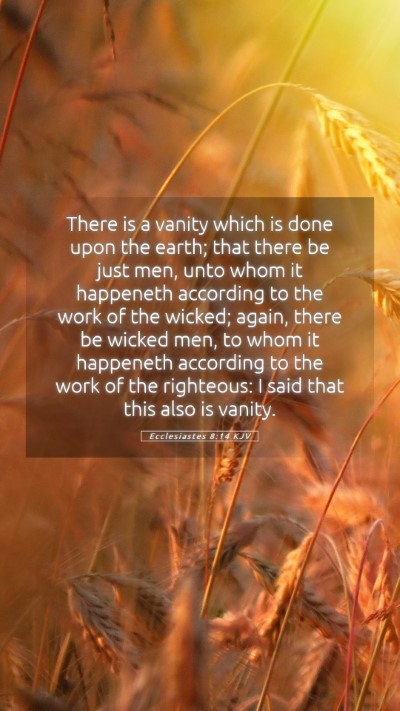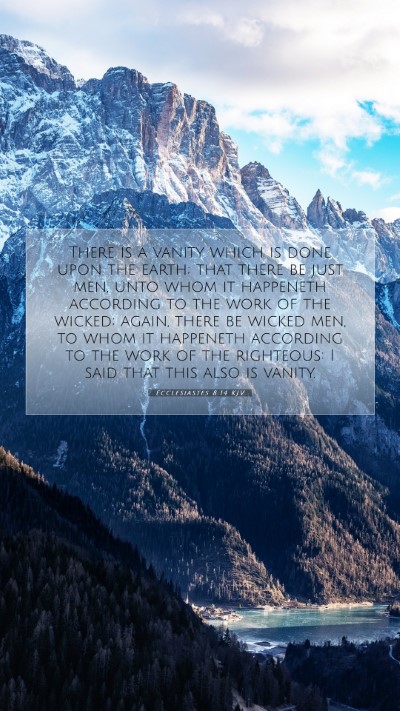Understanding Ecclesiastes 8:14
Ecclesiastes 8:14 states, "There is a vanity which occurs on earth, that there are just men, to whom it happens according to the work of the wicked; again, there are wicked men, to whom it happens according to the work of the righteous. I said that this also is vanity." This verse highlights the perplexities of life and the apparent injustices that take place.
Summary of Ecclesiastes 8:14
This verse grapples with the troubling phenomenon that sometimes righteous individuals suffer while wicked individuals prosper. This creates a confusion about justice and morality in the world, questioning the fairness of life and the nature of divine justice.
Insights from Public Domain Commentaries
Matthew Henry's Commentary
Henry emphasizes the strange reversals of fortune that can occur in life, suggesting that this paradox reflects a deeper, often hidden reality of divine providence. He argues that the apparent prosperity of the wicked and the suffering of the righteous may lead to a questioning of God’s justice, which ultimately reinforces the need for faith and tolerance in the face of life’s inequities.
Albert Barnes' Commentary
Barnes comments that this verse brings forward the mystery of divine governance, where the distinctions between the righteous and the wicked seem blurred. He notes that the Hebrew culture recognized that not all who appear righteous in their deeds would prosper, and likewise, not all the wicked would face immediate consequences. This prompts a call for deeper reflection on moral and spiritual truths instead of superficial judgments based on present circumstances.
Adam Clarke's Commentary
Clarke describes how this verse illustrates the inconsistency in life where justice is not often served in the expected manner. He mentions that this observation serves as a reminder that human understanding is limited and that believers should maintain faith while recognizing that earthly experiences do not always align with spiritual truths. Clarke encourages looking beyond the present into eternal perspectives, as God’s justice will ultimately prevail.
Application to Daily Life
To apply Ecclesiastes 8:14 in daily life, it is essential to acknowledge the complexities of justice and fairness. Here are a few practical applications:
- Maintain Faith: In confusing circumstances, maintain trust in a higher order, recognizing that God’s plans may transcend human understanding.
- Reflect on Justice: Consider your own life and the lives around you in light of the principles of justice and righteousness.
- Encourage Others: Use this understanding to support others who are facing injustice or hardship, affirming their experiences while reminding them of faith's importance.
Cross References
Ecclesiastes 8:14 can be correlated with the following scriptures that explore similar themes of justice and morality:
- Job 21:7-15: Job questions why the wicked prosper while the righteous suffer.
- Psalms 73:3-19: A reflection on envy towards the prosperity of the wicked.
- Proverbs 11:31: A statement that if the righteous are rewarded on earth, how much more the wicked and the sinner?
Conclusion
Understanding Ecclesiastes 8:14 requires recognizing the complexities and paradoxes of life, encouraging believers to seek deeper meanings behind the immediate outcomes observed in daily life. The verse serves as a call to uphold faith amidst confusion and encourages ongoing inquiry into the nature of divine justice.
Keywords: Bible verse meanings, Bible verse interpretations, Biblical exegesis, understanding Scripture, in-depth Bible verse analysis.


